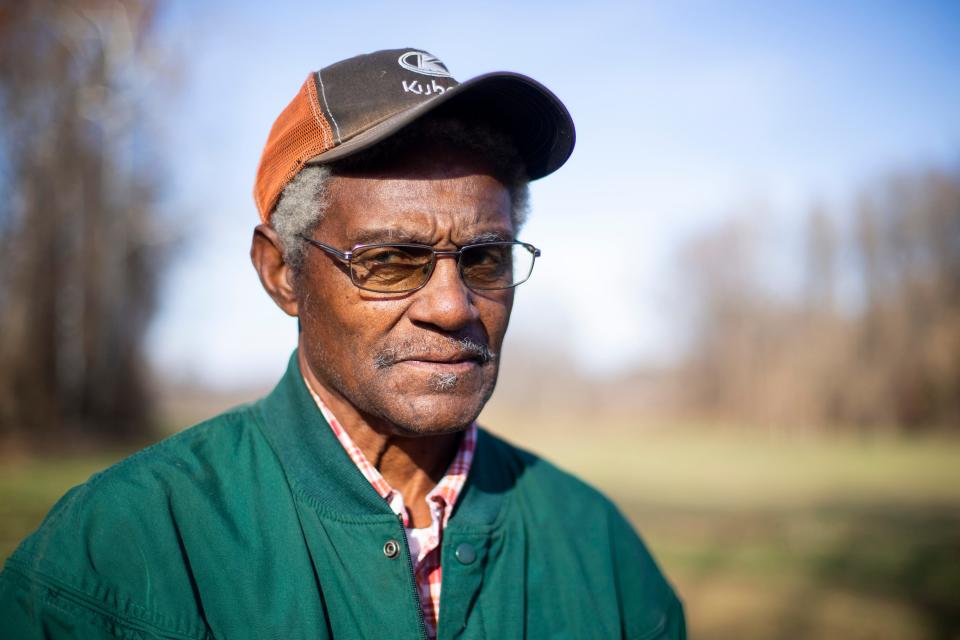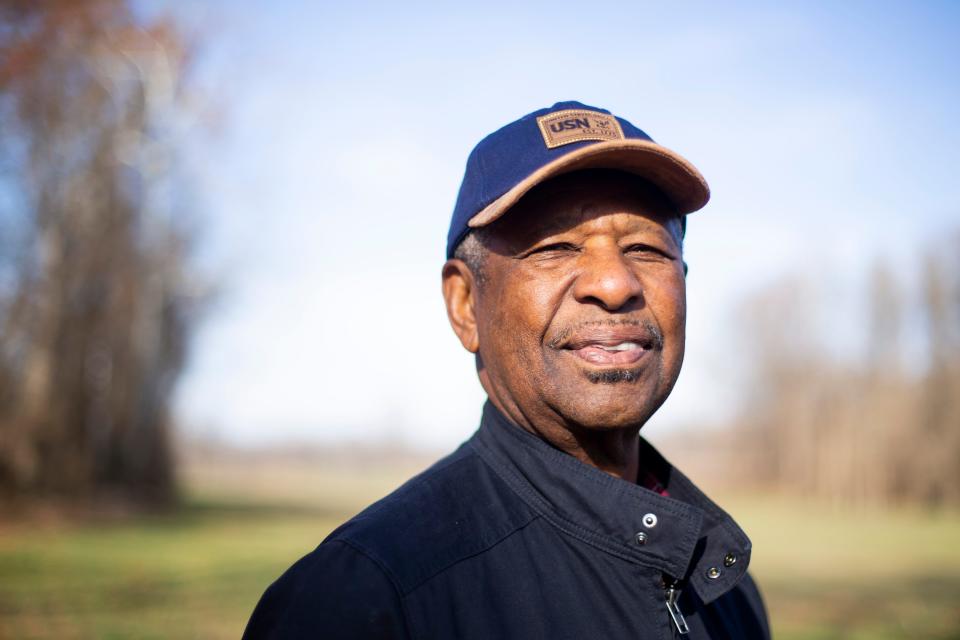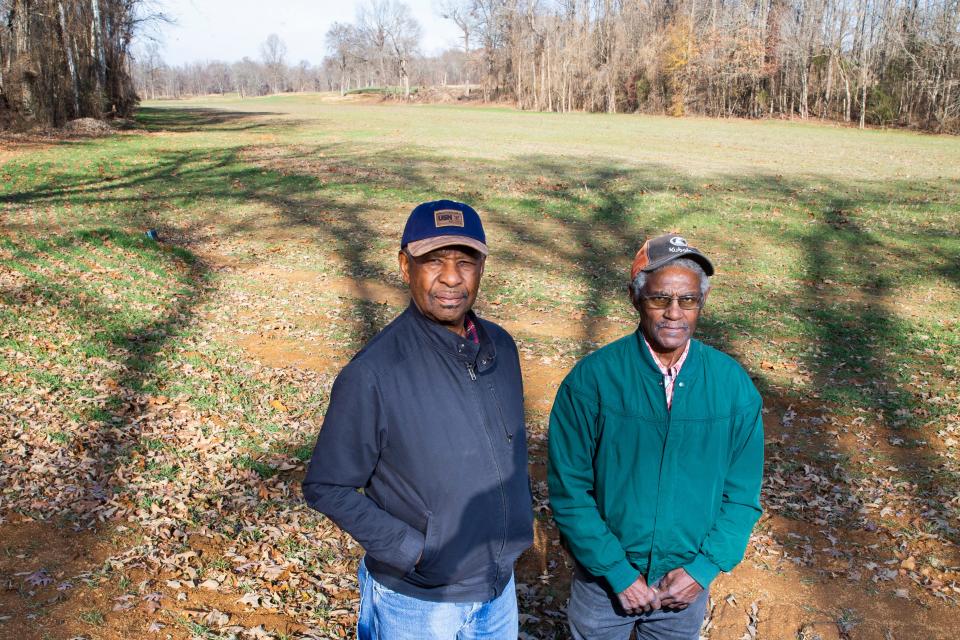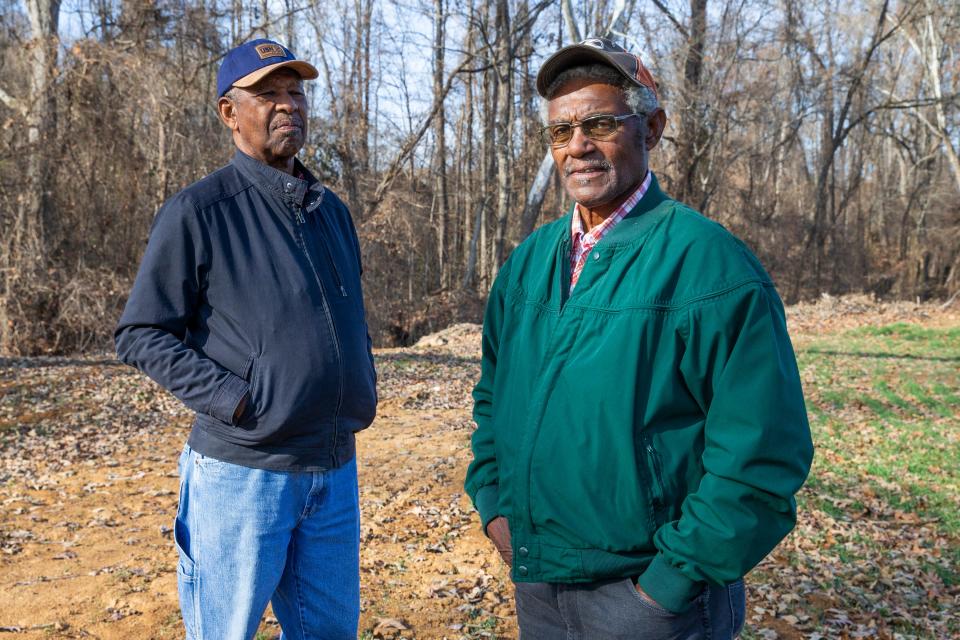Tennessee farmers hope USDA discrimination payments help them hold onto remaining land
In the late fall, with the soybeans shorn down to stubble and the limbs of the sycamore trees bare, it's easier to get the lay of James Melvin Johnson Sr.'s, Jackson, Tennessee farm. The 26 acres of gentle rises and sharp turns are close to where Johnson planted his first crop, cotton, at age 16.
Between the two of them, Johnson and his brother-in-law L.V. Jackson once farmed about 1,500 acres. The two men's holdings put together now amount to a few dozen acres, including this roadside patch and a couple of residential plots.
To hold onto what land remains and to propel their families into the future, the men are applying for a piece of the $2.2 billion U.S. Department of Agriculture Discrimination Financial Assistance Program, or DFAP.
Part of the Inflation Reduction Act, the DFAP will provide financial assistance to farmers, ranchers and forest landowners who experienced discrimination in USDA lending programs. Each applicant is eligible for up to $500,000.

At 72, Johnson hopes to retire soon. Jackson, 75, said his last year of farming was in 1984, the year before he started working for the University of Tennessee's agricultural extension service. But he remembers details from the decades of racism he faced as though they were yesterday, he said.
"Built into the system are ways that they could help you, but only if they wanted to help you," he said.
Both Jackson and Johnson said discriminatory practices by the USDA and its local agents cost them years of heartache and property loss. Both men said agents regularly withheld information about relief programs and other government help available to them.
Johnson said he found out from one friendly agent that he'd been shorted on disaster assistance payments for years. He said the financial loss is almost impossible to estimate.
"And you wouldn't believe the figures if I could," Johnson said.

The worst hard year
Johnson and Jackson point to 1973 as one of the worst years they endured as farmers. That was the year the skies dumped so much rain the soybeans were submerged. What could be harvested was choked with mud.
It was also the year the Farmers Home Administration, a former USDA agency created to help farmers access financial support, issued millions in emergency disaster relief to flooded-out farmers.
"But a lot of Black farmers, we didn't get that kind of money, at least I didn't," Johnson said. "I didn't know anything about it, nobody told me about it, nothing came in the mail ― nothing."
A Black agricultural extension agent from the University of Tennessee told the men about the available relief. Each farmer received the same reaction from the white agents at their local FHA offices: incredulity.
"This was not something they were publicizing in the community," Jackson said. "This was something that was between the good old boys at the county agricultural board meetings."

A life of farming
When Jackson was a child, his grandfather and father owned about 130 contiguous acres in Crockett County, Tennessee, where they grew commercial vegetable crops.
Jackson left the farm for the first time in 1968 when he was pulled out of college to serve in Vietnam as a combat engineer. By the time he returned the following year, his grandfather had gone blind and the farm was in bad shape.
Jackson asked his local FHA agent to help him secure a loan to get the farm growing again. That agent, who had once helped Jackson's grandfather pull vegetables from those very fields, refused to help. He said Jackson could never squeeze profit out of that soil.
Jackson saved money he earned working full-time at a shoe factory while finishing college to plant crops and grow his grandfather's acreage. He also saved his father's farm by paying off a predatory FHA-backed $13,000 loan for which Jackson's father had put up all 70 acres as collateral.

"A Black male like myself, back in the '60s, you just had to learn to maneuver in the system in order to try to make it," Jackson said. "So that's the way I started. I started from scratch. I just pulled myself up by my own bootstraps."
He estimated that land is now worth about $45,000 an acre, but of that 70-acre plot his father once owned, Jackson only retained 1.2 acres. His grandfather's farm is gone. Jackson's family sold it off for considerably less than it was worth to white farmers, he said.
"I had gone off to work at the university in March 1985, and by the time I returned about 4-5 years later, it was gone," he said.
A painful process
A former agricultural extension director, James Reaves works with the Windsor Group to help Tennessee farmers like Jackson and Johnson apply for the DFAP.
He said he's seen firsthand the pressure these farmers endure, the debt they get in that forces them to sell valuable acreage.
"What happens a lot of times is you end up selling the land and the white man buys the land," he said.

Reaves said the DFAP application period has been rife with scammers, such as predatory lawyers who charge farmers for helping with the 40-page, 10-step application. But there is free aid available through organizations including the Windsor Group.
It's no wonder farmers are looking for an easy fix. By most accounts, the application is a painful process, and there's no guarantee it will result in a payoff.
For his part, Jackson has been working for months to dig up the tangible proof, the actual receipts of discrimination, the DFAP application requires.
"You have to prove that you've been discriminated against," he said. "I farmed in the '80s, and this is 2023. We're talking 30 or 40 years. How am I going to prove something that way back?"
Jackson has looked through court records and visited extension offices, but he's having trouble finding loan receipts and proofs of sale. They seem to have disappeared, he said.
"So you say you want to compensate me for the discrimination that I went through, but yet you make it difficult for me knowing that I'm going to have a problem trying to get this information," he said. "And a lot of us didn't even finish the eighth grade."
Despite all the work they're putting in, despite the discrimination they've faced, neither farmer holds high hopes they'll receive much money from the USDA ― the very organization that's been keeping them down for years.
"I think if you're down and other people are up, I think the up people will try to keep the down people down," Johnson said. "Because whether you're Black, blue, green or what, instead of wanting a piece of the pie, they want the whole pie."
This article originally appeared on Nashville Tennessean: After decades of discrimination, Black farmers hope for USDA funding
